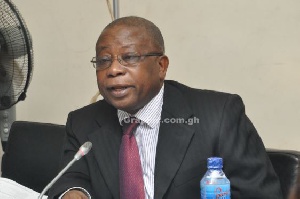 Health Minister, Kwaku Agyeman Manu
Health Minister, Kwaku Agyeman Manu
The Ministry of Health is to send a proposal to Cabinet to consider the subsidisation of the cost of treating diabetes, which is relatively costly.
Mr Alexander Kojo Abban, a Deputy Minister of Health, announced this at the 2019 International World Diabetes Day, marked at Apam in the Gomoa West District of the Central Region.
He said there were also considerations for certain aspects of the treatment to be covered under the National Health Insurance Scheme.
The Member of Parliament for the Gomoa West Constituency, however, advised Ghanaians to adopt healthy lifestyles and go for regular medical checkups to ensure the early detection should they get the disease.
November 14 is observed annually across the world to create awareness on diabetes and how it can be prevented, regulated and easily treated to avert complications.
The World Health Organisation defines diabetes as a chronic, metabolic disease characterised by elevated levels of blood glucose (or blood sugar), which leads over time to serious damage to the heart, blood vessels, eyes, kidneys, and nerves.
It occurs either when the pancreas does not produce enough insulin or when the body cannot effectively use the insulin it produces.
Insulin is a hormone that regulates blood sugar. Hyperglycaemia or raised blood sugar, is a common effect of uncontrolled diabetes and over time leads to serious damage to many of the body's systems, especially the nerves and blood vessels.
In 2014, the world health body says 8.5% of adults aged 18 years and older had diabetes, while In 2016, diabetes was the direct cause of 1.6 million deaths.
In 2012, high blood glucose was the cause of another 2.2 million deaths.
Mr Abban said unhealthy habits such as poor eating, physical inactivity, alcohol and tobacco use made one susceptible to contracting Type 2 diabetes.
Type1 diabetes is, however, genetically acquired.
Mrs Elizabeth Esi Denyoh, President of the National Diabetes Association Ghana, said the awareness creation would not end on the Day because her association would keep liaising with government, stakeholders and other policy makers on better ways of treating the disease.
Statistics on Diabetes was very worrying so urgent measures were needed to minimise it.
According to the International Diabetes Federation, there were 518, 400 cases of diabetes in Ghana in 2017.
She said: "At the moment, Ghana is placed 5th in Africa on the World Diabetes statistics."
" However, the worrying trend is that most diabetics are wrongly diagnosed."
In 2017 alone, about 34,000 people were amputated due to severe diabetic conditions.
Mrs Denyoh said many health workers shunned practising solely in diabetes treatment because there were no incentives.
However, diabetes could be controlled if there were adequate awareness creation programmes and dedicated treatment from specialised health professionals.
She appealed to the government to create a disability fund to assist persons who had been disabled by the disease.
There should also be foot care centres for treating diabetes of the leg.
Obotantam Nana Adu Effrim, Chief of Apam Traditional Area, who chaired the event, urged the Government to prioritise the treatment of diabetics because it was a major health condition.
He promised to do his best as a traditional leader to help create awareness on the disease and urged other traditional rulers, church leaders, Muslim leaders and civil society organisations to help.
The event brought together stakeholders, including health professionals from across the country, community health students from the College of Community Health Nursing-Winneba, community members and traders.